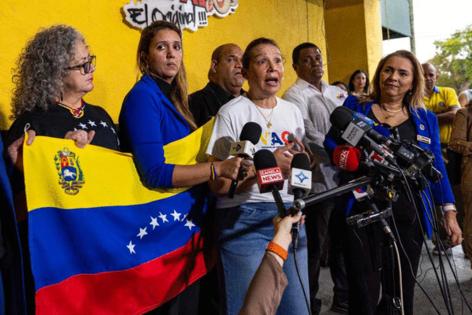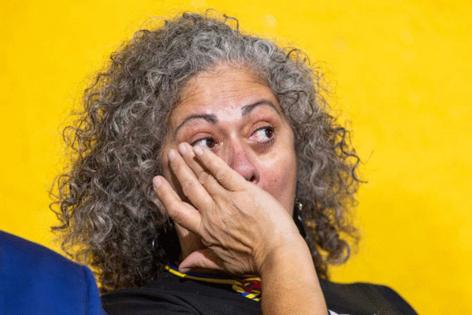Venezuelans fight back against TPS termination, battling for right to stay in the U.S.
Published in News & Features
South Florida’s Venezuelan immigration advocates said Monday they are uniting to fight what they view as “political persecution,” following the Trump administration’s decision to end deportation protections for hundreds of thousands of Venezuelans in the U.S.
The advocates say they are preparing to challenge the termination in court, fighting to protect their right to stay and work in the U.S. Several nonprofit organizations said that the Trump decision, announced Sunday, is a political stunt that targets Venezuelans, and that the Republican Party had betrayed them, especially after Venezuelan strongman Nicolás Maduro’s illegitimate reelection in July 2024, which has further fueled the instability they fled from.
“There will be multiple court cases demanding the nullification of this measure. Today marks the beginning of a fight that has just begun. Venezuelans are not alone,” Adelys Ferro, executive director of the Venezuelan American Caucus, said at a press conference at El Arepazo restaurant in Doral. “We stand with you, and we will use every legal avenue this country provides — the law, the legal system, and the courts — to ensure the truth about the Venezuelan community in this nation is heard.”
The League of United Latin American Citizens, the Hispanic civil rights organization, said it is backing the Venezuelan nonprofit in its legal fight against termination of Temporary Protected Status. Gustavo Rivera, deputy director of LULAC, told the media that the 97-year-old civil rights organization is committed to supporting the Venezuelan community in its battle.
“We stand united with the Venezuelan population in the U.S. to help reverse this unjust decision,” Rivera said. “This is wrong, and we will not tolerate it. We’re here to help, to represent, and to stand together in solidarity.”
There are more than 900,000 Venezuelans living in the U.S., according to Census figures. At least half a million of them are beneficiaries of TPS. Nearly 350,000 of them face the possibility of deportation when their status ends in April.
The advocates’ stance came after the Trump administration revoked TPS for Venezuela, which offers nationals from the South American country deportation protections and work permits. In a federal notice, the Department of Homeland Security said that while “certain conditions” for TPS remain, there had been “notable improvements in several areas such as the economy, public health, and crime” in Venezuela But the agency noted that even if the conditions remain, it is not in the national interest of the U.S. to maintain the designation.
The agency estimates that Saturday’s cancellation affects nearly 350,000 Venezuelans who were granted the status during a 2023 expansion. Those granted TPS under a 2021 designation, close to 257,000, have their status through September. Homeland Security Secretary Kristi Noem must make a decision on whether to extend or eliminate the 2021 designation. While that status has not been officially revoked, the cancellation of the 2023 designation is a bellwether for what’s likely to come.
“Continuing to permit Venezuelans under the 2023 TPS designation to remain in the United States does not champion core American interests or put American interests first,” a Homeland Security notice said.
‘Conditions are worse’
The notice said that TPS has enabled a large number of individuals without a clear immigration status to settle across the U.S., posing significant challenges to local communities. Homeland Security addded that some members of the Tren de Aragua criminal gang have entered the country with the help of the federal program.
On the NBC News show “Meet the Press” on Sunday, Noem said TPS has been “abused.” She echoed false generalizations that “folks from Venezuelans that have come into this country are members” of Tren de Aragua, a gang with roots in the South American country. While it is suspected that some members of the criminal organization have entered the country in recent years, most experts agree that their numbers are very small.
At a press conference in Doral on Monday, Ferro said that only around 600 TPS recipients have ties to Tren de Aragua, “just 0.04% of our community.” She pointed out that applicants undergo biometric screenings, fingerprinting and background checks to get TPS and work permits.
To be eligible for TPS, an applicant must have been in the U.S. before a certain cutoff date. They cannot receive the protections if they have been convicted of a felony or two or more misdemeanors, are inadmissible under federal immigration law because they have criminal backgrounds, or have engaged in terrorist activities.
José Antonio Colina, president of Veppex, a Venezuelan exile nonprofit organization based in Miami, highlighted the deteriorating conditions in Venezuela and said the Biden administration had extended TPS based on the same conditions that the Trump administration had cited to revoke the status.
“The secretary of Homeland Security has said that Venezuela no longer has the same conditions it had when TPS was granted — and she is correct: Venezuela’s situation has worsened, not improved,” Colina said. “The country now faces an illegitimate president who clings to power with the backing of corrupt military generals, many of whom are implicated in drug trafficking. This regime not only persecutes, kidnaps, and disappears anyone who opposes it, but the most striking example of this is that María Machado, the main leader of the opposition, is currently hiding within Venezuela.”
‘Collapse of Doral’s economy’
Maureen Porras, vice mayor of Doral, the U.S. city with the largest Venezuelan population, warned that if the Trump administration’s decision is not reversed, the city could face a devastating economic collapse. More than 40% of Doral’s 84,000 residents have roots in Venezuela.
“We have numerous members of our Venezuelan community with TPS, many of whom are business owners, others are workers in businesses in the city, who have played a crucial role in keeping our economy thriving.” Porras said. “If these individuals are forced to leave, we would be left in a serious economic downturn and could potentially lead to the collapse of our local businesses.”
Porras, who is also an immigration attorney, and who recently changed her party affiliation from Democrat to Republican, said the TPS revocation wasn’t done in a manner consistent with the law. “Currently Venezuela is not in a position to receive its Venezuelans in a safe manner,” she said.
“As a lawyer and as the vice mayor of this city, I will continue to advocate and fight so that our community has access to the resources and information necessary to continue to fight and continue to prepare for what may come from all of this,” she added
Doral Councilman Rafael Pineyro, the only current Venezuelan city official, said that if the Venezuelans are forced to leave, they will face extreme danger.
“We are talking about a regime that continues to be dictatorial,” he said. “A regime where there are no humanitarian guarantees, where there are political prisoners. So we are talking about returning a group of Venezuelans who are workers who have already bet on this country that opened the door to them, returning them to where? To a dictatorial regime.”
Pineyro said conditions in Venezuela have not improved: “The Venezuelan condition has worsened in recent years under the Maduro regime.”
Pineyro criticized Noem, calling her remarks on "Meet the Press" “ignorance of what the Venezuelan community really is” after she characterized recently arrived Venezuelans as gang members, mental patients and former prison inmates.
“I am an elected official who was born in Venezuela. My family emigrated to the United States more than 20 years ago, and thanks to this country that opened its doors to us, today I can say that I am an elected official, but Tren de Aragua certainly does not represent what Venezuelans are,” he added.
Doral Mayor Christi Fraga struck a more cautious tone. She said she agreed with “zero tolerance for disorder, for uncontrolled immigration,” but at the same time said she is worried about the fate of Venezuelans.
“This has become their home and we know how positive they have been in our community,” she said. “Doral is an example of that.”
_____
©2025 Miami Herald. Visit miamiherald.com. Distributed by Tribune Content Agency, LLC.










Comments